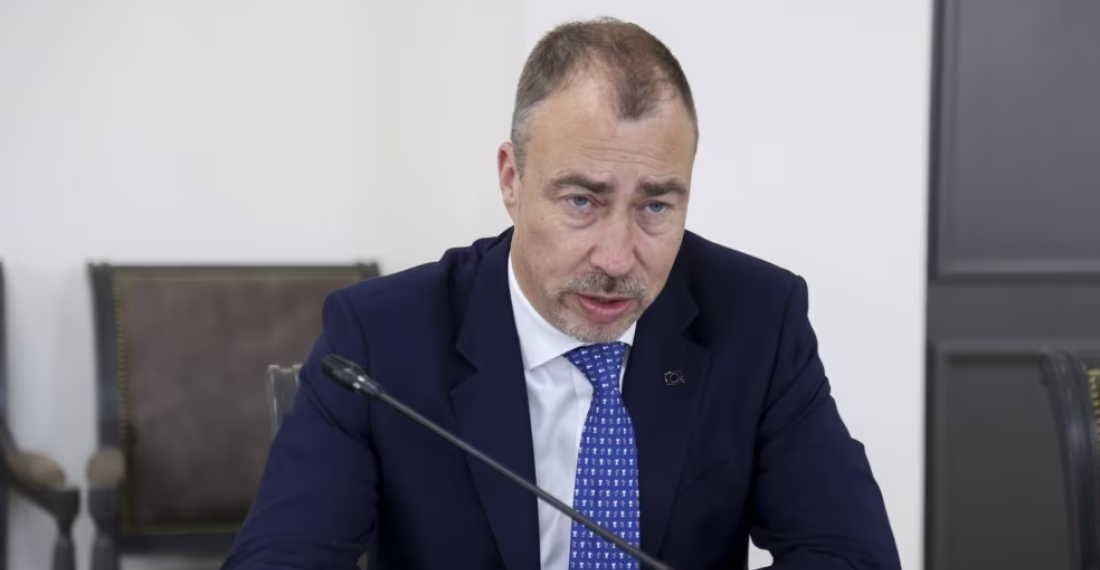The European Union's Special Representative for the South Caucasus and the Crisis in Georgia on Tuesday (18 July) gave an extensive interview to the Armenian news outlet AlphaNews in which he spoke about the situation on the Lachin Corridor, Stepanakert-Baku dialogue, addressing hate speech between Armenia and Azerbaijan, and Nagorno-Karabakh supply lines, among other topics.
On the Lachin Corridor, which since December 2022 has seen periods of restricted or zero movement in both directions between Armenia and Nagorno-Karabakh, Toivo Klaar referred to statements from the European Union which have emphasised the Corridor's re-opening.
"Meetings were held in the EU with various participants aimed at resolving the situation. I'm not saying that this is a simple process, but we are fully and absolutely involved with various international partners in the process of finding solutions to the situation," said Klaar.
On the issue of the rights and security of the population of Nagorno-Karabakh, Klaar said that they are "working on a solution [...] so that people can feel safe in their homes". Klaar added that "the European Union and the head of the European Council Charles Michel are fully involved in the search for solutions" to this end.
On Stepanakert-Baku dialogue, Klaar said that the EU is striving to establish such a dialogue.
"Dialogue will solve problems and help solve the current situation, which, of course, is absolutely unbearable. I understand that this is an extremely difficult situation. The EU is working with all the international players who are dealing with this issue, I hope and believe that together we can find a solution," Klaar said.
Later in the interview Klaar added, "we have a conflict that lasted 35 years. All sides have accumulated a lot of painful feelings, a lot of emotions over 35 years, and we cannot expect anything else. But it needs to be overcome, and only dialogue can help to survive these emotions, because we are working hard to help establish a dialogue between Stepanakert and Baku."
"In my opinion, the only way forward is dialogue, and here we have consistently stressed that it is necessary to stop the spread of hate speech. It is obvious that the rhetoric of hatred complicates the situation much more, and the leaders of the countries are responsible for this. I understand that this is all very difficult, but again, I see that there is no alternative to dialogue, I repeat, it will help guarantee the security and rights of the Armenians of Nagorno-Karabakh."
On supply lines to Nagorno-Karabakh, Klaar argued for movement along the Lachin Corridor to be restored and welcomed an Azerbaijan proposal to develop supply lines to the region via Aghdam.
"I think both roads are important. The Lachin corridor should be opened, and this is what is foreseen, what should happen. At the same time, if there is a proposal to provide supplies from Aghdam, then you can take advantage of this opportunity," Klaar said.
"We have stated very clearly that the Lachin corridor needs to be opened," Klaar added later. "But at the same time, I believe that any proposals, in addition to the Lachin corridor, not as an alternative to the Lachin corridor, but in addition to it, should also be used."
"The restoration of electricity and gas supply, the restoration of transport and the supply of goods are necessary to move forward. All this is an absolutely necessary part of this package. This requires extensive work, and again, the EU is working with all interested international and local players in this direction, and I do not see an alternative to this work," said Klaar.
On historical memory of the Armenia-Azerbaijan conflict, Klaar said that this will "not go away". He added, "it will not disappear, it needs to be worked on, it needs to be overcome, not forgotten. This requires political leaders to turn the page, to build another South Caucasus. We are convinced that this is possible, and again, that is why we are so intensely involved in this process."
On the issue of detainees, Toivo Klaar confirmed that it is on the agenda at every leaders' meeting. "It has always been raised and will be raised until it is understood that there are no such prisoners in Baku or Yerevan."
source: commonspace.eu with AlphaNews. The content of this article was taken from a Russian-language translation of the original English-language interview that was not published by AlphaNews, translated back into English.
photo: RFE/RL



